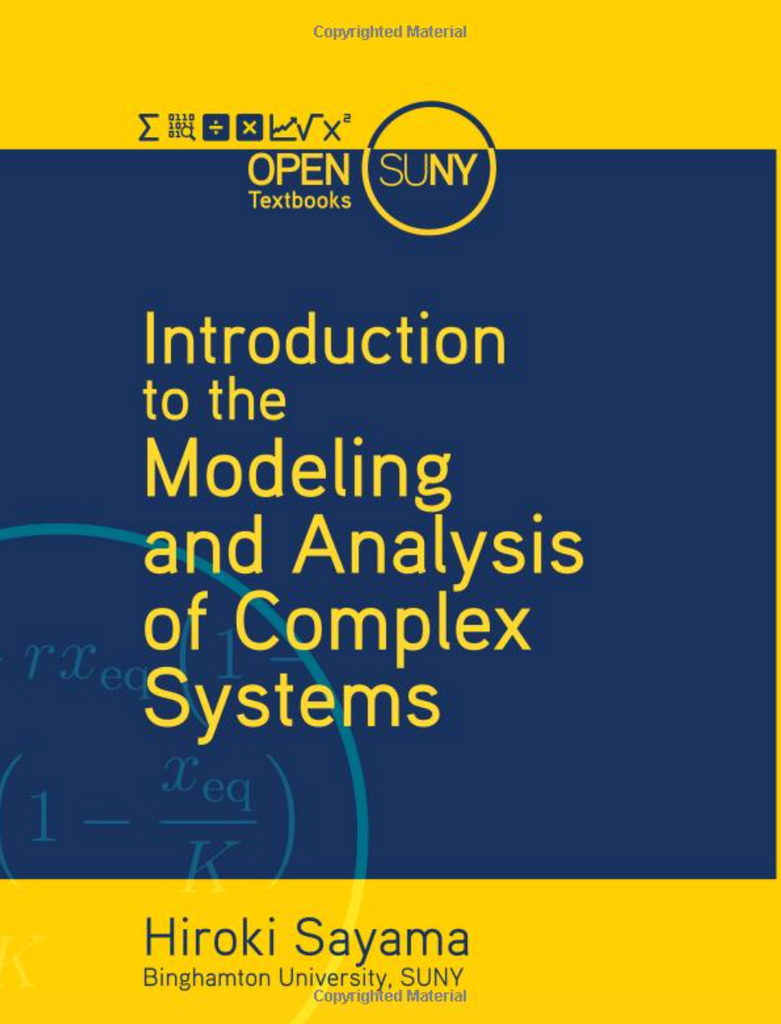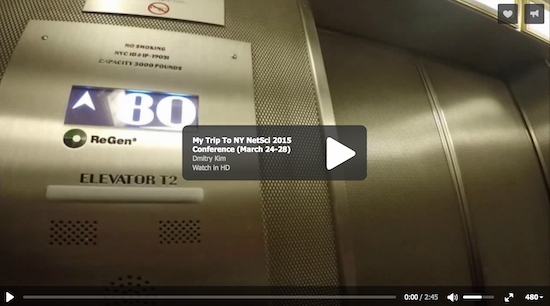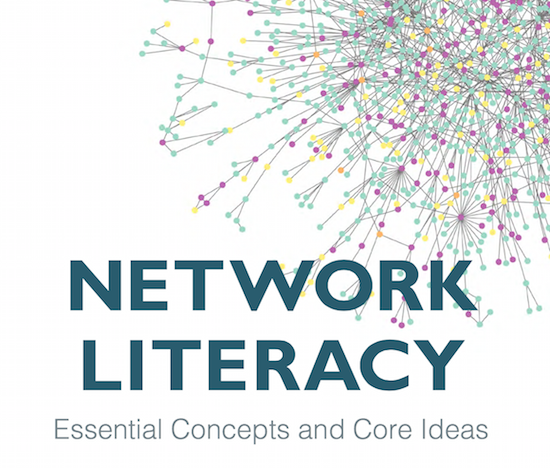Category: #DataNetSciK20
Hiroki Sayama Publishes Complex Systems Textbook
NetSci High collaborator Hiroki Sayama has recently published the textbook
Introduction to the Modeling and Analysis of Complex Systems
Introduction to the Modeling and Analysis of Complex Systems introduces students to mathematical/computational modeling and analysis developed in the emerging interdisciplinary field of Complex Systems Science. Complex systems are systems made of a large number of microscopic components interacting with each other in nontrivial ways. Many real-world systems can be understood as complex systems, where critically important information resides in the relationships between the parts and not necessarily within the parts themselves. This textbook offers an accessible yet technically-oriented introduction to the modeling and analysis of complex systems. The topics covered include: fundamentals of modeling, basics of dynamical systems, discrete-time models, continuous-time models, bifurcations, chaos, cellular automata, continuous field models, static networks, dynamic networks, and agent-based models. Most of these topics are discussed in two chapters, one focusing on computational modeling and the other on mathematical analysis. This unique approach provides a comprehensive view of related concepts and techniques, and allows readers and instructors to flexibly choose relevant materials based on their objectives and needs. Python sample codes are provided for each modeling example.
NetSci High Goes to CompleNet
With a supplemental award from NSF all our NetSci High students and teachers participated in the 6th International Workshop on Complex Networks. The NetSci High students presented their posters at CompleNet and discussed their work with attendees, and attended the entire conference and networked with some of the top researchers in the Network Science field, including some of the founders of the field such as Reka Albert and Mark Newman.
At CompleNet, NYSCI is hosting "Big Data Fest", a public science event.
The term “Big Data” is frequently used to describe everything from how social media are used to gather information about consumers, to how data affect political, environmental and economic decision-making, to data that address security and health concerns. Yet although we might know that Big Data affects our daily lives, its exact nature – what Big Data is, and how it works – remains a mystery to most of us.
Big Data Fest pulls back the curtain on Big Data – revealing what it is, how it can help you know more about your world and how it helps the world know more about you. You will get to tinker with Big Data and interact with the researchers who work with it, find out how data and information have been used throughout history, and the ways that Big Data help us to better understand ourselves and how we fit into a global society. Through a wide variety of activities for all ages you will experience first-hand and hands-on how the most important scientific and technological advancements are made through the collecting and mapping of many different kinds of data - from the pictures you take with your phone to the satellites that hover above the Earth.
Big Data Fest is free with admission to the New York Hall of Science (NYSCI) and all registered attendees of the International Workshop on Complex Networks (CompleNet 2015), and will include art exhibits, hands-on activities, talks, demonstrations, performances and workshops happening throughout NYSCI.
Participants:
- MIT Macro Connections: Bringing data to life at MIT Media Lab
- Rutgers University COOL Lab: real-time ocean data
- Lamont Doherty Earth Observatory: human interactions in the environment
- Sloan Digital Sky Survey: 3-D maps of the universe
- NYU ITP: communications tech and the arts
- Network Science for the Next Generation: data research with high schools
- Beacon Institute: Hudson River real-time data
- CoCensus Interactive: Queens Data Laboratory
- MindRider: Citibike and the many moods of cycling culture in NYC
- Welikia: Historical and contemporary NYC ecosystems data
- NYSCI Noticing Apps: surprising things you can learn from your own data
- Friends in Space: connect with astronauts and make friends around the world
- SourceMap: Where does everything come from and how does it get to you?
- MakerSpace: Build your own sensors and map your own data streams
- Humanexus: How data have been with us all along
For more information, visit: Big Data Fest @ CompleNet 2015
NetSci High Student Video Retrospective of CompleNet:
Network Literacy: Essential Concepts and Core Ideas
"Network Literacy: Essential Concepts and Core Ideas" is now available.
Cambridge Science Festival Workshops April 22nd
When: April 22, 2015
Where: Boston University (School of Education Room 130, 2 Silber Way)
Time: 2 pm - 4 pm (note new times)
Free registration at: Cambridge Science Festival Registration Page
The field of network science aims to solve some of the most complex problems facing our society today. In this series of discussions and workshops for teens, families, educators, learn to see the world around you in a whole new way… through the lens of networks! Networks are embedded in our society, biology, chemistry, technology infrastructures, and so much more. Networks are at the interface of science and art. The workshops are progressive in nature or can stand alone. Sign up for as many sessions as you wish.
The workshop will cover the following:
Network Science Overview
Discover the many ways in which network science is changing the ways we explore our and make meaning of our interconnected world. Learn about the role of networks in the spread of disease, the crash of stock markets, the toppling of dictators, and more.
Network Science & Visualizations
Explore some of the principles of design in computational visualization of data and networks and survey a wide range of data visualizations
Student Research
Learn about research a high school student team has done on biological networks.
Organizations and Networks
Many successful organizations accomplish their goals by creating a board of directors, or a small group of people who can support, advise and inspire them. Create your on board of directors and use concepts of network science to consider how best to grow your organization.
For any questions, please contact Paul Trunfio at trunfio@bu.edu
NetSci High: Bringing Network Science Research to High Schools
A paper describing the success of the project NetSci High is now published as part of the proceedings for the 6th Workshop on Complex Networks (CompleNet).
Authors: Catherine Cramer, Lori Sheetz, Hiroki Sayama, Paul Trunfio, H. Eugene Stanley, Stephen Uzzo
We present NetSci High, our NSF-funded educational outreach program that connects high school students who are underrepresented in STEM (Science Technology Engineering and Mathematics), and their teachers, with regional university research labs and provides them with the opportunity to work with researchers and graduate students on team-based, year-long network science research projects, culminating in a formal presentation at a network science conference. This short paper reports the content and materials that we have developed to date, including lesson plans and tools for introducing high school students and teachers to network science; empirical evaluation data on the effect of participation on students' motivation and interest in pursuing STEM careers; the application of professional development materials for teachers that are intended to encourage them to use network science concepts in their lesson plans and curriculum; promoting district-level interest and engagement; best practices gained from our experiences; and the future goals for this project and its subsequent outgrowth.
NetSci High: Bringing Network Science Research to High Schools
NetSci High Featured on Stelar
This summer, twenty four students had an opportunity to meet Dr. Alex “Sandy” Pentland from MIT’s Media Lab, Dr. Gene Stanley from Boston University’s Center for Polymer Studies, and other researchers to learn about current applications in network science. The goal of ITEST’s Network Science for the Next Generation - known as “NetSci High” - is to immerse high school students and teachers in the burgeoning field of network science through a yearlong research experience. Each year, NetSci High begins with an intensive 10-day summer workshop where students and teachers are introduced to network science concepts, learn programming skills in Python, and practice creating basic network models using visualization software. At the end of this summer’s workshop, eleven student teams who had just completed their year-long NetSci High research projects during the previous school year took the floor to present their work. The projects represented the interdisciplinary nature of network science and its ability to draw students of all interests into STEM fields. Titles of their research topics included:
- A Network Analysis of Foreign Aid Based on Bias of Political Ideologies
- Comparing Two Human Disease Networks: Gene-Based and Symptom-Based Perspectives
- Influence at the 1787 Constitutional Convention
- Quantifying Similarity of Benign and Oncogenic Viral Proteins Using Amino Acid Sequence
- Quantification of Character and Plot in Contemporary Fiction
- RedNet: A Different Perspective of Reddit
- Tracking Tweets for the Superbowl
During the upcoming 2014/15 academic year, research lab faculty and graduate student mentors will guide the new student teams through the research process. They will participate in data collection, data processing, network modeling, and analysis, using freely available computer tools. The teams will further explore how to visualize different types of networks, calculate network statistics, and describe network processes, and will then analyze the data to find answers to their specific research questions. Students will also visit the New York Hall of Science, the Network Science Center at the United States Military Academy West Point, and Stevens Institute of Technology in order to broaden their exposure to current network science research.
NetSci High has opened doors for me that would not be open without the program. I have continued to work with computer science as well as network science. I am currently working with [grad student] to map out the recent Ebola outbreak in West Africa. Thank you once again and I hope to hear from you soon. - J.I., member of 2013/14 New York metro area team.
We are proud that the NetSci High project has garnered scholarships for student participants, fostered student-authored publications in peer-reviewed journals, and supported student teams in presenting research posters at the International NetSci conferences in Budapest, Hungary; Chicago, Illinois; and Berkeley, California. As the NetSci High organizers, we look forward to increasing network science literacy through continued student research opportunities, broader teacher training, and publishing a Network Science Workshop Training Manual for other groups to use.
This is a reprint of an article appearing on the: STEM Learning and Research Center.
NetSciEd3 Berkeley
NetSciEd3 was held June 2, 2014 at the NetSci International Conference at University California Berkeley. The satellite workshop focussed on network science teaching and learning at all levels of formal and informal education, as well as how network science helps inform and understand learning processes and organizations.
The morning included presentations, posters, and a hands-on working roundtable in which we collaboratively attempted to map NetSci concepts to formal curriculum frameworks.
Topics included:
- Teaching Teachers Network Science Concepts
- Network Science in K-16 Practice and Policy
- Network Science in Informal Education
- Tools for Teaching Network Science
- New Directions in Learning Science
- Developing Metrics for Effective Educational Collaboration Networks
Visit: NetSciEd3




